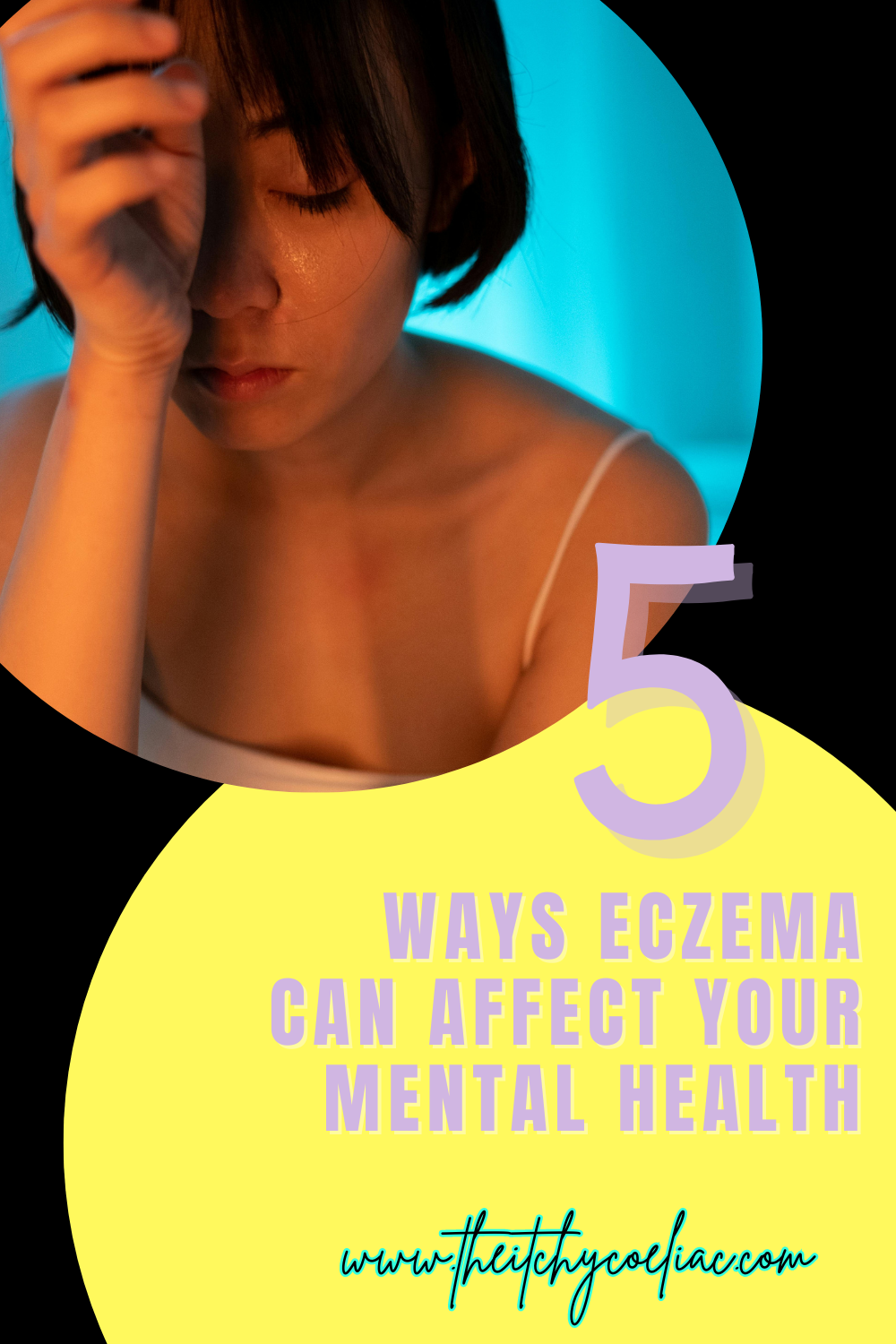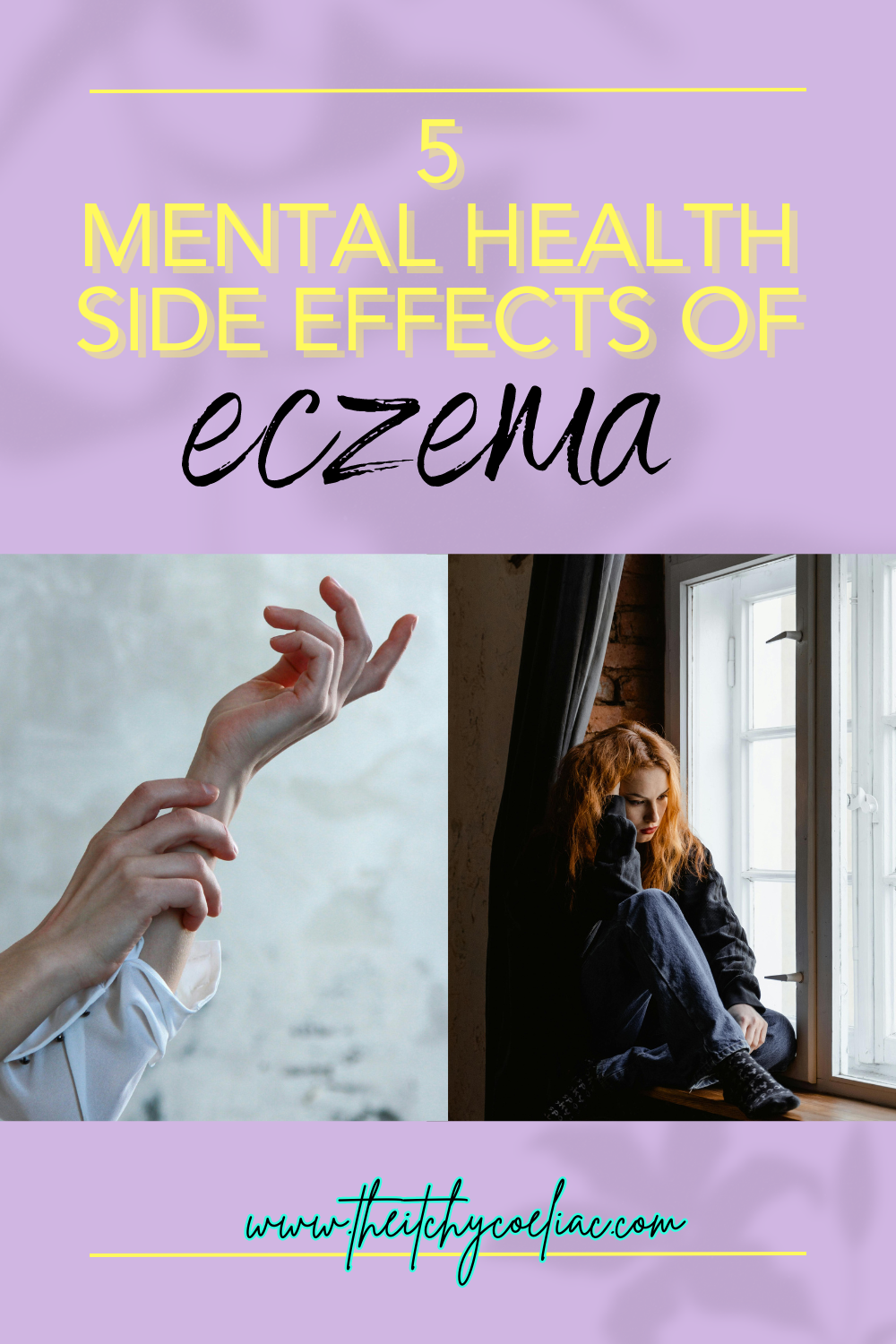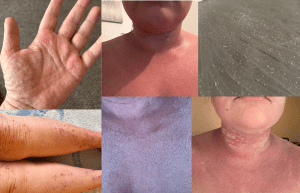When it comes to having Eczema, it tends to come hand in hand with some mental health side effects. I’ve listed just a few ways that your itchy skin can be messing with your head – and a few things you can try to fight it!
Why not pin it for later?

Not sure exactly what Eczema is? Make sure to go read What is Eczema? CC’s Ultimate Guide to Itchy Skin to get all your questions answered!
1. Eczema damages your body image
A huge mental health effect of having Eczema is what it does to the way you see yourself in the mirror. Whether it’s just a small patch of dry skin in the creases of your elbows, or if it’s full body flares and flaking, our brain zero’s in on it every time we see ourselves.
I’m very guilty of spending a long time examining my face in the mirror. Not out of vanity, but because I’m searching for every tiny hint of Eczema. And then I’m worrying that other people can see it too.
People with Eczema can be extremely conscious of the way they look, even if to those around them it’s not immediately obvious.
In the summer, I liked wearing dresses. They were comfortable and helped me keep sweating to a minimum (preventing flare ups!). But I was intensely aware of the fact that I had Eczema on my legs and scarring from past flares.
I would try my hardest to pull the dress down so it covered them or I would wear tights and pay the consequences later when I peeled the sweaty nylon from my legs at the end of the day. All that was going round my head was ‘you shouldn’t be wearing this, look how ugly your legs are and everyone can see them’.
Yet, when I asked family members if they could see it, they would genuinely have no idea what I was talking about unless I pointed it out to them.

Eczema affects your body image because it makes you believe that everyone can see the imperfections, the rashes, the marks on your skin. It makes you believe that they’re huge and ugly and horrifying.
But the truth? It never looks as bad as we tell ourselves it does.
Our brain, while an amazing thing, can sometimes be our own worst enemy. I listen to a Podcast by a woman named Faith Mariah and she definitely says it best. Our brain is looking for ways to prove the thoughts that we have about ourselves. So if we’re telling our brain ‘my skin is ugly, my skin looks horrible’ then your brain is going to look for ways to prove it.
It’ll be sure to point out the fact that you can see the scars and marks on your legs when you wear that dress. It’ll make sure you focus in on the red circle flares around your eyes. It will show you your imperfections and say yes, you’re right look how bad it is.
For those of us with Eczema, body image is something we struggle with – in one way or another. It sucks when you put on an outfit you love, go to the mirror and can’t see past the dry patch of skin on your neck.
Unfortunately for this one, there is no quick fix that I can recommend. Body image is still something that I really struggle with.
But what I’ve learnt is that it’s important to have people around you that are there for you, not your skin. Just this weekend my sister came to stay over at mine. The whole weekend my face was flaking like crazy and was very irritated. She didn’t mention it once and even though it probably just didn’t occur to her to say anything, I was unbelievably grateful.
I think by surrounding yourself with a brilliant support network that cares about you – and not your skin – and perhaps by talking to yourself a little more kindly when you’re looking in the mirror, we can fight back against the body image issues that Eczema can cause.
2. Eczema makes you feel like a burden to loved ones
Something I’ve always found difficult about having Eczema, is the way it affects my family and friends. That seems like a weird thing to say, right? After all it’s not them that has the skin condition! But that doesn’t mean that they’re not impacted by it as well.
Having Eczema for pretty much my entire life meant that it was just the norm in our household growing up. My parents knew better than to tell me to stop itching, my mum knew she had to use non-scented laundry detergent so I didn’t get irritated. They all came to accept that there would be a little trail of skin flakes everywhere I went.
The thing is, even though they all accepted it and didn’t seem bothered by it, I couldn’t help but feel guilty about it.
There were certain moments when their patience would simply run out (and I don’t blame them for it!).
I would be sitting on the sofa scratching and my mum would yell at me because I was getting flakes all over the place.
Dad would have planned a weekend out but if my Eczema had flared and I couldn’t face going he would get annoyed that I couldn’t suck it up and go.
These moments were few and far between but each one caused my brain to fall into a spiral where I told myself just what a burden and a nuisance I was to them.

This is something that hasn’t really lessened the longer I’ve lived with my Eczema. You always feel guilty when you sleepover at a relatives house and there’s spots of blood on the sheets from where you’ve scratched in the night. Not to mention the snow flurry of flakes!
Again, I think just an amazing support system is the key. If the people around you are able to make you feel at ease and supported, you can safely tell that voice in your head that it’s wrong. Because it definitely is.
You are not a burden because of your skin condition. It’s not something you asked for and it’s not something you can magic away. Your family, friends, loved ones care about you and they’re usually more than happy to help out if they can. We just have to remind ourselves of it sometimes!
3. It can feel massively isolating
Eczema can be a lonely condition.
Oftentimes, people with Eczema can feel totally isolated from those around them and like nobody really understands.
A lot of people don’t understand and it can be frustrating sometimes trying to explain why you can’t use that particular hand wash or why your face is so red.
It can be a little complicated because there are a lot of people out there that do have Eczema. It’s just that usually the only ones you encounter growing up are your neighbour Jan’s granddaughter that had a small patch on her elbow two years ago. (“She used Aveeno and it just cleared right up! Why don’t you try that?”)
Until I was in my early 20’s, I didn’t know of anyone that had Eczema the way I did.
I didn’t know anyone that had giant, red, inflamed patches all over my body. Nobody seemed to shed their skin the way I did. It only seemed to be me that had to deal with this!
Obviously, I know now that I was in my own little world because there are thousands of people in the world that suffer from Eczema.

Eczema can also be isolating in the sense that you have to exclude yourself from a lot of things.
If you’re having a bad Eczema flare up, you might not be able to go out with friends. Or you might have to miss a family birthday. Sometimes it might be activities you can’t do. I’ve had to say no to paddling in the ocean before because I know that my legs will be itchy as hell afterwards if I do.
There’s that old familiar sense of FOMO when you’ve had to say no to something because of your skin. It can feel terrible when you’re sitting at home, slippery with moisturiser, knowing that your friends are out having a great time. You feel a stab of jealousy while you’re sitting on the sidelines as your sisters are doing each other’s make-up.
It can affect your mental health this way especially because it’s very easy when you’re in the above situations, to tell yourself that you are alone.
When you’re sitting at home, applying ointments and wet wraps, it’s a very easy thing to listen to that voice in your head. It’s usually telling you how nobody understands, nobody cares, you’re all alone in this big itchy world.
It is wrong.
And that leads me to point number four…
4. Eczema can fill your head with negative thoughts
In a couple of my earlier points I’ve mentioned some of the negative thoughts that can come from having a skin condition. They’re always there and they’re always looking to break you down.
My skin is ugly, I look disgusting, I’m horrible
I’m a burden to my family, they don’t need me causing this trouble
Nobody understands me, I’m alone
Some other negative thoughts than can come from having Eczema might be:
This will never end, I’m always going to be like this
I’m missing out on my life
I hate my skin

When you have a skin condition like Eczema, it can become almost natural to think badly about yourself or your skin. It took me a very, very long time to realise that I needed to be kinder to myself. (I’m still learning how to do that!).
These negative thoughts were not serving me. They didn’t make my skin any better and they didn’t make me feel any better. They didn’t help me so I had to learn to dispel them and replace them.
I’m not really too into the whole positive affirmation thing but for me, talking to my brain about my skin like it was a person seemed to help. If it came at me with a thought like ‘your skin is never going to be nice and smooth’, I’d hit it back by thinking something like ‘just you watch, I’m going to show you’.
I don’t know if that makes any sense but that’s kind of how my mind is working at the minute! Brain brings a negative Eczema thought, I dispel it with either a challenge or an opposing positive thought.
It’s not foolproof and there are definitely days when the negative thoughts win but I think the main thing here is to be aware of them and be kind to yourself!
5. Eczema causes you to be mentally exhausted – all the time
One thing I know for absolutely certain is that Eczema is an exhausting condition to live with.
It’s physically exhausting because of the many, many sleepless nights caused by itching or pain. But it’s also massively mentally exhausting.
When you have Eczema, your skin is literally fighting against your body, meanwhile your body is fighting right on back and it can really affect your energy levels. Plus, while all that is going on, your brain is making sneaky attacks at your mental health as well!
For me, this is one of the mental health effects that I think isn’t acknowledged enough. These are just a few things that cause me to feel drained mentally:
- Trying to make myself stop itching
- Recovering from a big flare up
- The constant cycle of flare, manage, rinse, repeat
- Feeling like it will never end
- Fighting to stay positive and not let it engulf my entire life
- Having to think constantly about whether something will irritate my skin
- It’s it’s already flared, trying to work out what’s caused it
- Going through a never ending stream of new products and trying to find one that works for longer than a couple of weeks

Okay so maybe that was a little more than a few but the reality of it is that Eczema comes with all these things and they really drain your batteries.
This can then lead to other problems, like not feeling up to going out or having a short temper. I know I’ve been guilty of both these things.
There’s been many times that I’ve simply felt too mentally exhausted to get dressed and go to a family event. Or I’ve snapped at a friend over something silly because I was just feeling so run down, it was making me irritable.
When it comes to mental exhaustion, again there’s no magic fix. The best thing you can do is take that time for yourself. When you’re feeling drained, make sure you’re allowing yourself to take some time to recharge, reset and heal.
If you have to take a day every now and then away from your responsibilities and others expectations to get yourself sorted, that’s better than running on empty.
Eczema can also be really physically exhausting because of the effects it has on your sleep. You can read more about it in my post Who Needs Sleep When You Have Eczema?
So that’s 5 ways that Eczema can affect your mental health. This isn’t an exhaustive list. Eczema has a boat load of other mental health challenges that I’ll probably dive into in another post.
I just want people to be aware that Eczema is not ‘just a rash’ and it can take a massive toll mentally on those who have it. It’s so important that we are able to speak about it and work through it.
The best advice I can give you if you’re struggling is to take time for yourself (remember: recharge, reset and heal!) and don’t be too hard on yourself. You’re doing brilliantly.
I would also suggest joining the Eczema communities online to help fight that isolation. When I joined Instagram and followed a bunch of Eczema Warriors, it was like my eyes were opened. I wasn’t alone, there were loads of people like me!
It’s a very supportive community and if you’re nervous about joining, go follow me and say hi! I follow loads of people with Eczema so check people I’m following to find some amazing and often very helpful people!
Let’s all work together to make sure we’re taking care of our mental health, as well as our skin.





